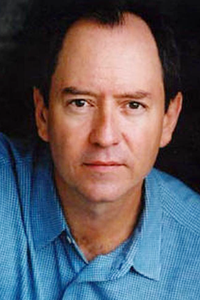‘Mad’ as he was having a stroke, actor has focused his life on ‘hope’ for stroke patients and their families
October 14, 2010

Carl McIntyre
Carl McIntyre had achieved success as an actor in movies, theatre and television commercials. Married and the father of three children, McIntyre was living the all-American dream in Charlotte, N.C.
And then, the unexpected happened.
While rocking his son to sleep, McIntyre said his right arm and leg began to grow numb. “And I was mad. I was holding him tight with my left hand, and I was mad that something was wrong.”
That “something” proved to be a massive stroke that left him with aphasia, which is caused by damage to the language regions of the brain’s left hemisphere.
The American Heart Association reports that about 795,000 Americans have a new or recurrent stroke annually. About 55,000 more women than men have strokes, and blacks are nearly twice as likely to have a first-time stroke than whites. When separated from other cardiovascular diseases, stroke ranks No. 3 in causes of death, just behind diseases of the heart and cancer.
The Southeast is considered the “stroke belt” in the United States – and South Carolina is often called “the buckle on the stroke belt.”
Like McIntyre, about one-third of all stroke patients have aphasia.
McIntyre’s struggle to regain his speech and coordination are chronicled in the short film Aphasia, which will be shown for the Arnold School of Public Health’s annual Winona B. Vernberg Distinguished Lecture at 1 p.m. Friday, Oct. 22, in the Russell House Theatre. The event is free and open to the public and University community.
McIntyre will be a guest speaker at the lecture, which also will include marks by Arnold School researcher Dr. Julius Fridriksson of the Department of Communication Sciences and Disorders. Fridriksson, the director of the Aphasia Laboratory at USC’s Arnold School, will discuss his research on aphasia and stroke, which recently was highlighted in the Journal of Neuroscience.
The actor’s determination to regain his life came as no surprise to his family and friends. While no one could imagine at the time of the stroke what his outcome might be be, McIntyre knew that he had to push ahead, even when doctors told him that his recovery would plateau somewhere between six to 18 months. Five years later, he continues to make progress.
“I am hardheaded and a fighter, and I believe that I can get better,” he said of his struggle then and now. “I will never be the same but I can still get better.”
McIntyre was unable to speak at first and hindered by coordination problems. He struggled to regain his speech and mobility. And while some people may be reluctant to share such a personal story, McIntyre said that he was eager to put his story on film.
“I wanted to write a book with my wife about our experience, and then the film came along,” he said. “I thought I looked skinny on film! I thought the movie was great.”
The film has captured the attention and hearts of stroke patients and their families, as well as the film industry. Aphasia has been selected for the Foyle Film Festival in Northern Ireland that begins Nov. 17. The festival, which attracts movie industry leaders, is Oscar® affiliated, enabling winners of specific competitions to submit their films for Academy Award consideration.
Aphasia recently won the audience award for Best Short Film at the 2010 Big Bear Lake International Film Festival and an El Capitan award at the Yosemite Film Festival. After its showing in Columbia, Aphasia will be screened as an official selection of the Fort Lauderdale International Film Festival in Florida and the Radar Hamburg International Film Festival in Germany.
Having the national and international acclaim for the film is gratifying, McIntyre said, but “just making the film, I have won. Being with my friends and acting again are wonderful to me. All the attention that Aphasia is getting is exciting … and I am so glad for the experience and to be working again.”
He is most pleased that the film is impacting stroke survivors. “That has been wonderful, knowing that I can help somebody else ... that something good has come from me having a stroke. The film gives you a sense of HOPE!”
As for his own future, McIntyre embodies the spirit of the film. “I hope to teach an acting class at Chapel Hill for the aphasia group (at the University of North Carolina). I still hope to do acting in commercials and more. Endless possibilities.”
The lecture will follow the 35th Anniversary Luncheon for the Arnold School at 11:30 a.m. in the Russell House Ballroom. To learn more about the luncheon, visit http://sph.sc.edu/news/vernberglecture3.htm.



_01.jpg)